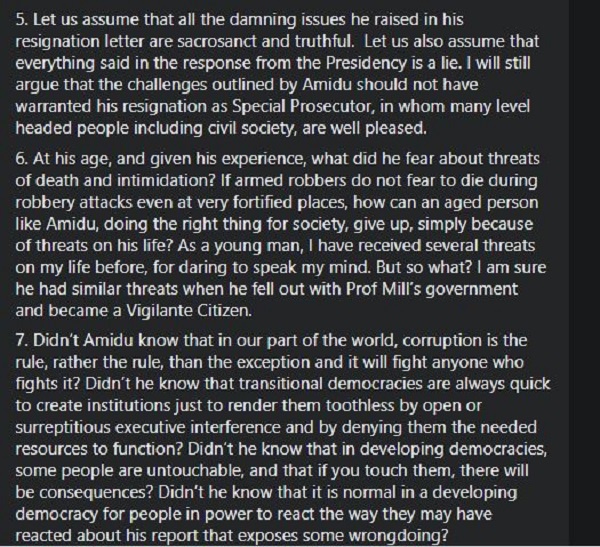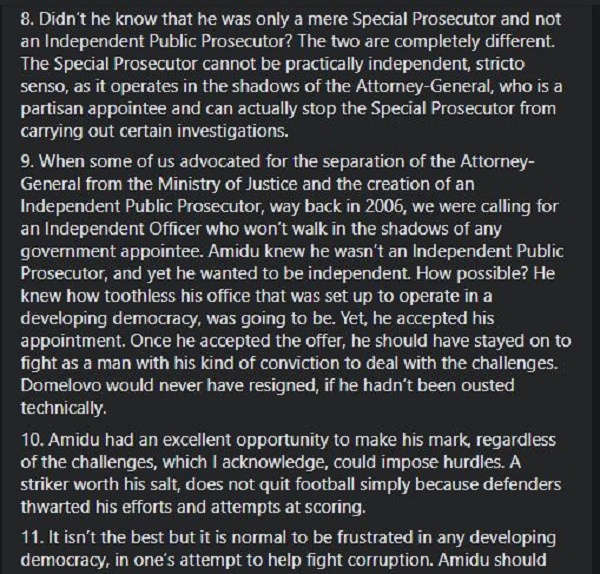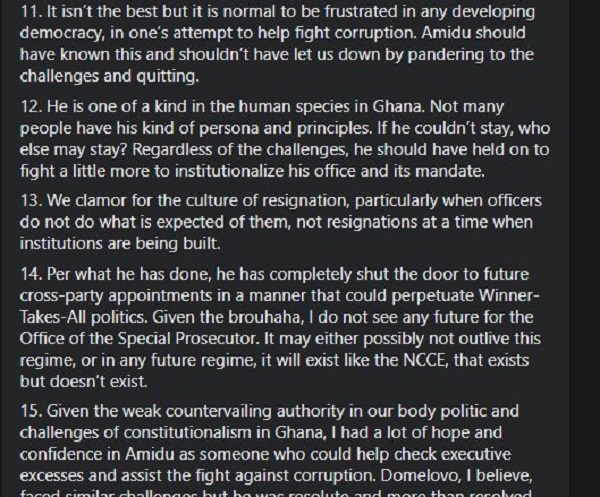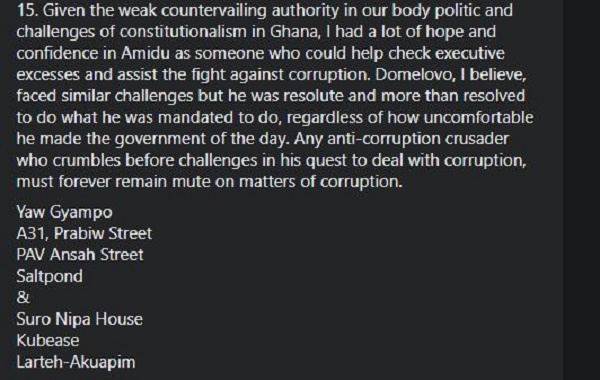 Martin Amidu, former Special Prosecutor with President Akufo-Addo
Martin Amidu, former Special Prosecutor with President Akufo-Addo
President Nana Addo Dankwa Akufo-Addo has responded to allegations raised by former Special Prosecutor, Martin Amidu in his resignation letter.
In a nine-paged 40 paragraphed response signed by Nana Bediatuo Asante, Secretary to the President, Nana Akufo-Addo expressed hope that the statement of facts settles the issues and allegations contained in Mr Amidu’s letter.
He also gave a chronology of amounts of money made available to the Office of the Special Prosecutor (OSP) during the tenure of Martin Amidu.
According to the Presidency, despite doing everything humanly possible to make available the required resources for the smooth operation of the OSP, Mr Amidu could not recruit the staff he so desired to get work started.
According to the Presidency, in the 2019 financial year, clearance was given to the OSP to recruit some 249 staff.
Mr Amidu, it would be recalled, on Monday, November 16, 2020, tendered in his resignation in a letter addressed to Mr Akufo-Addo.
In the letter, Mr Amidu, among other things, complained about how he did not get the desired logistical and personnel support to effectively carry out his official duty and how the presidency is interfering in his work.
On the back of this, Senior Political Science Lecturer at the University of Ghana, Professor Ransford Gyampo is still at sea following the row between the government and immediate past Special Prosecutor, Martin Amidu.
According to him, after reading the resignation letter of Mr Amidu and the response from the presidency, he is finding it difficult to know who is telling Ghanaians the truth.
In a fifteen point comment on his social media handle, the Political Science lecturer wrote:
I have read Amidu’s letter of resignation and the imponderable allegations he made. I have also read the response to the allegations from the Presidency.It is now quite difficult to emphatically say who is telling the truth. It is Amidu’s word against the President’s word. But there must be the truth somewhere that ought to be found after further and better particulars that may come from the expected response from Amidu to the President’s letter, and a possible response again from the Presidency.
I am therefore unable to post the lengthy article I authored on the issue this dawn, because of the two sides of the matter now, which makes it imperative for some more interrogation. I will do some more search and take some time to interrogate the two sides. While this goes on, my preliminary view is that, it is disappointing that Amidu resorted to the line of least resistance by resigning from his post. He should have stayed on to fight as a man with principles, conscience and clothed with some security and protection from the laws. His resignation suggests to me that, he was either not committed to fighting corruption beyond “his long epistles” or he is completely ignorant about what it takes to fight corruption in a transitional democracy like Ghana. Let us assume that all the damning issues he raised in his resignation letter are sacrosanct and truthful. Let us also assume that everything said in the response from the Presidency is a lie. I will still argue that the challenges outlined by Amidu should not have warranted his resignation as Special Prosecutor, in whom many level headed people including civil society, are well pleased.
At his age, and given his experience, what did he fear about threats of death and intimidation? If armed robbers do not fear to die during robbery attacks even at very fortified places, how can an aged person like Amidu, doing the right thing for society, give up, simply because of threats on his life? As a young man, I have received several threats on my life before, for daring to speak my mind. But so what? I am sure he had similar threats when he fell out with Prof Mill’s government and became a Vigilante Citizen.
Didn’t Amidu know that in our part of the world, corruption is the rule, rather the rule, than the exception and it will fight anyone who fights it? Didn’t he know that transitional democracies are always quick to create institutions just to render them toothless by open or surreptitious executive interference and by denying them the needed resources to function?
Didn’t he know that in developing democracies, some people are untouchable and that if you touch them, there will be consequences? Didn’t he know that it is normal in a developing democracy for people in power to react the way they may have reacted about his report that exposes some wrongdoing? Didn’t he know that he was only a mere Special Prosecutor and not an Independent Public Prosecutor? The two are completely different. The Special Prosecutor cannot be practically independent, stricto senso, as it operates in the shadows of the Attorney-General, who is a partisan appointee and can actually stop the Special Prosecutor from carrying out certain investigations. When some of us advocated for the separation of the Attorney-General from the Ministry of Justice and the creation of an Independent Public Prosecutor, way back in 2006, we were calling for an Independent Officer who won’t walk in the shadows of any government appointee.
Amidu knew he wasn’t an Independent Public Prosecutor, and yet he wanted to be independent. How possible? He knew how toothless his office that was set up to operate in a developing democracy, was going to be. Yet, he accepted his appointment.
Once he accepted the offer, he should have stayed on to fight like a man with his kind of conviction to deal with the challenges. Domelovo would never have resigned if he hadn’t been ousted technically. Amidu had an excellent opportunity to make his mark, regardless of the challenges, which I acknowledge, could impose hurdles. A striker worth his salt does not quit football simply because defenders thwarted his efforts and attempts at scoring. It isn’t the best but it is normal to be frustrated in any developing democracy, in one’s attempt to help fight corruption. Amidu should have known this and shouldn’t have let us down by pandering to the challenges and quitting. He is one of a kind in the human species in Ghana. Not many people have his kind of persona and principles. If he couldn’t stay, who else may stay? Regardless of the challenges, he should have held on to fight a little more to institutionalize his office and its mandate. We clamour for the culture of resignation, particularly when officers do not do what is expected of them, not resignations at a time when institutions are being built. Per what he has done, he has completely shut the door to future cross-party appointments in a manner that could perpetuate Winner-Takes-All politics. Given the brouhaha, I do not see any future for the Office of the Special Prosecutor. It may either possibly not outlive this regime, or in any future regime, it will exist like the NCCE, that exists but doesn’t exist. Given the weak countervailing authority in our body politic and challenges of constitutionalism in Ghana, I had a lot of hope and confidence in Amidu as someone who could help check executive excesses and assist the fight against corruption.
Domelovo, I believe, faced similar challenges but he was resolute and more than resolved to do what he was mandated to do, regardless of how uncomfortable he made the government of the day. Any anti-corruption crusader who crumbles before challenges in his quest to deal with corruption must forever remain mute on matters of corruption.




